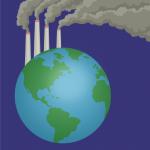There is virtually unanimous scientific agreement about climate change. Yet due to both the inherent complexity of the topic and the social controversies surrounding it, confusion and doubt often persist. Here are four central questions about climate change, together with brief answers based on the current best scientific understanding of climate change and links to more detailed information.
 Is the climate changing right now? Scientists who study the Earth’s climate today and who investigate past climates agree that global temperature has increased rapidly and significantly in the last 150 years. We’re also seeing similarly dramatic changes in other aspects of climate and related effects on ecosystems, including the distribution of rainfall, storm activity, extinction of plant and animal species, and seasonal change.
Is the climate changing right now? Scientists who study the Earth’s climate today and who investigate past climates agree that global temperature has increased rapidly and significantly in the last 150 years. We’re also seeing similarly dramatic changes in other aspects of climate and related effects on ecosystems, including the distribution of rainfall, storm activity, extinction of plant and animal species, and seasonal change.
How much does human activity affect climate change? Many independent lines of evidence show that human activity is responsible for most of the climate change in recent years, particularly the warming of the atmosphere and ocean in the last 150 years, and that these changes will continue into the future. Carbon dioxide is produced when humans burn gasoline, natural gas, and coal to produce electricity and drive cars, trains, ships, and aircraft. This carbon dioxide is the major factor responsible for warming the atmosphere.
How will climate change affect the world and our society? Climate change will have many different effects on society and on the natural world. Plant and animal species are adapting to changing environments by migrating to new areas. As species move, they bring diseases with them to farms and human populations. Biodiversity diminishes as some species become extinct due either to human-caused climate change or to related human activities such as habitat destruction or toxic pollution. Higher temperatures create new risks for wildfires and place new pressures on farmers. Melting polar ice raises sea levels, putting coastal cities at greater risk of floods.
What can we do about climate change? It is possible to prepare for climate change and to avert the worst effects of it, but to do so we need to understand why climate change is happening and make informed choices as individuals and communities based on the scientific evidence. Information alone is not enough to choose appropriate policies and strategies to limit some climate changes and prepare society for changes that are already well under way, but without understanding the basic causes and effects of climate change, we will be unable to make informed decisions that will affect generations to come.
